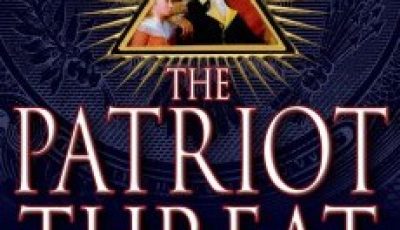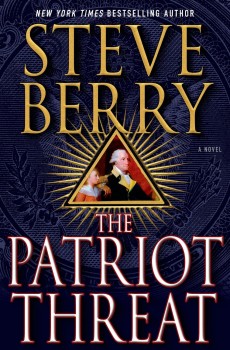

Special to The Big Thrill: Breaking into the Thriller Game
The Big Break—Stories of Breaking into the Thriller Game:
Steve Berry’s 12 Years and 85 Rejections
 By Jeremy Burns
By Jeremy Burns
This fall will mark twelve years since Steve Berry burst onto the scene with his special blend of action, history, secrets, conspiracies, and international intrigue. During that time he’s released more than a dozen bestselling thrillers, seen his books translated into forty languages and released in fifty-one countries, and has become a household name among audiences the world over. His success has given him a platform to garner attention for historical landmarks and libraries in need through his History Matters non-profit organization. For many aspiring authors, Steve is the big time, the level of success that up-and-coming authors dream of. And yet, it was not always that way.
Far from it, in fact.
Steve’s writing journey doesn’t start in 2003, when he debuted with The Amber Room, or even in 2002, when he signed his first publishing contract with Ballantine Books. Instead, we have to dial the clock back twelve years, when a thirty-five-year-old Berry finally answered that “voice” in his head telling him to write. Over the next decade, Steve would write eight complete manuscripts. In 1995, agent Pam Ahearn recognized his talent and signed him. For many aspiring authors landing a top agent, someone who is in the publishing business and believes in your stories as much as you do, is a major milestone, a validation that you’re doing something right and that your long-awaited window of opportunity is just around the corner. But sometimes, as Steve learned the hard way, that window could actually still be a long time coming.
As Steve finished manuscripts, Pam would send them out to every publisher that handled thrillers back then. Over the next seven years, those five manuscripts Pam submitted racked up rejections.
Eighty-five times.
According to Steve, one big publishing obstacle was the kind of books he wrote. From the onset he wrote what he loved, the same kind of history-riddled, secrets-laced international action thrillers he’s known for today. When he started writing, the publishing industry considered those sorts of books “spy thrillers,” and, with the exception of blockbuster names like Ludlum and Cussler, who brought their own followings apart from ebbs and flows in the popularity of the genre itself, demand for the spy thriller dried up in the 1990s, at the end of the Cold War. Which, unfortunately, was around the time Steve started writing.
But Steve didn’t give up. Despite a growing list of editors saying his work didn’t make the cut, he persevered, diligently writing every day while continuing to run his law practice, and serving as a local county commissioner. And despite the industry insisting that the market for the stories he was passionate about telling had gone the way of the Soviet Empire, he refused to chase whatever trends might seem like an easier sell. He had set a goal for himself, one of the hardest in the business, both then and now. He wanted to be a commercial fiction writer, and he wanted to do it telling stories in the genre he loved. For a dozen years, and seven-dozen attempts, his dream was rebuffed. But on his eighty-sixth try, in a classic case of preparation meeting opportunity, the pieces finally clicked into place.
The Amber Room wasn’t his most recent manuscript in 2002, but Steve thought it was strong enough to warrant a second attempt in the publishing world. Pam submitted the manuscript to a young editor at Ballantine named Mark Tavani, who was looking for new authors to add to his roster. Little did Steve know that Ballantine, an imprint of Random House, was on the lookout for books to release with a book that fellow Random House imprint Doubleday had recently acquired. They were looking for books that merged the international intrigue and action of the traditional spy thriller with the historical secrets that were so integral to Steve’s books. The big release they were looking to supplement was none other than Dan Brown’s The Da Vinci Code, the blockbuster phenomenon that would shatter sales records the world over and popularize the history-secrets-conspiracy-action-intrigue genre that Steve had been writing for more than a decade. Tavani snatched Steve up, with Ballantine releasing the already-completed manuscripts of The Amber Room, The Romanov Prophecy, and The Third Secret in short order. All three books had been rejected by every publisher in the business, but now, those same books were climbing sales charts and earning Berry a steadily growing following.
Steve had mixed feelings about that moment when his window of opportunity finally opened after a decade of rejection. Part of him was, of course, elated, as his dream of becoming a commercial fiction writer for a major New York publishing house was finally coming true. But another part of him just felt relieved, a “finally!” moment where all those years of hoping that his writing was good enough were finally vindicated.
“I was in the right place, at the right time,” Steve says of the opportunity Da Vinci created for him. “It was extremely exciting, but at the same time, I was like ‘wow, finally.’ You get frustrated after twelve years, a little numb to everything.”
His perseverance paid off—and continues to pay off—in a big way. Aside from The Amber Room, The Romanov Prophecy, and The Third Secret, approximately seventy percent of those other five manuscripts have found their way into his other published books, from key scenes, settings, and other elements to the vast chunks of his four short stories/novellas that tie into his now long-running Cotton Malone series.
Since Steve found his big break, the publishing industry has changed significantly. From the rise of eBooks and Amazon to the demise of Borders, Waldenbooks, B. Dalton, and other key brick-and-mortar booksellers, the traditional publishing model has had to adapt to a massive upheaval in how books are discovered, distributed, marketed, and sold. This higher-risk environment often makes publishers more resistant to taking a chance on unproven authors.
“It may be the hardest it’s ever been to break into the traditional publishing realm,” Steve says.
But regardless of whether an aspiring or up-and-coming author wants to eventually become a perennial New York Times bestseller or just to share his or her story, this may, in fact, be the best time to be an author in history.
“If your goal is to have an audience, to get your story out there, independent publishing provides an avenue to test the market,” Steve says.
In fact, the digital age has created unprecedented opportunities for newer authors, with hundreds of independent and mid-level publishers—many helmed by former editors from major NYC houses—offering a myriad of potential avenues for publication. And if your eventual goal is to be published by a Big Five house, that avenue is still available.
“You’d come to traditional publishing with a track record,” Steve says, adding that your track record could help or hurt your pitch. “The problem with a traditional publisher is that someone will be judging your work, someone who you’re asking to invest a lot of money in you. Story is everything, though. The first goal of every author, no matter where you are in your career, should be to give potential readers a good story.”
From more than a decade of publishing experience and more than two decades of writing, Steve offers four key tenets for authors to grow into a place where breakthroughs can happen. “Learn your genre. Know the business. Know your craft. And, once you become a commercial fiction writer, never forget the market.”
Whatever your dream, be it becoming a bestselling author, a unique storyteller, or something altogether separate from writing, Steve Berry knows a thing or two about perseverance in the face of seemingly overwhelming odds, and offers sage advice for anyone else fighting that uphill battle to achieve your goals.
“Don’t tell me you can’t do it,” Steve says. “I’m the poster child for ‘it can be done.’ You can’t quit, you can’t give up. Apply your discipline, stick with it, and luck will come your way.”
*****
 Steve Berry is the New York Times and #1 internationally bestselling author of The Patriot Threat, The Lincoln Myth, The King’s Deception, The Columbus Affair, The Jefferson Key, The Emperor’s Tomb, The Paris Vendetta, The Charlemagne Pursuit, The Venetian Betrayal, The Alexandria Link, The Templar Legacy, The Third Secret, The Romanov Prophecy, and The Amber Room. His books have been translated into 40 languages with 19,000,000 copies in 51 countries. They consistently appear in the top echelon of The New York Times, USA Today, and Indie bestseller lists.
Steve Berry is the New York Times and #1 internationally bestselling author of The Patriot Threat, The Lincoln Myth, The King’s Deception, The Columbus Affair, The Jefferson Key, The Emperor’s Tomb, The Paris Vendetta, The Charlemagne Pursuit, The Venetian Betrayal, The Alexandria Link, The Templar Legacy, The Third Secret, The Romanov Prophecy, and The Amber Room. His books have been translated into 40 languages with 19,000,000 copies in 51 countries. They consistently appear in the top echelon of The New York Times, USA Today, and Indie bestseller lists.
History lies at the heart of every Steve Berry novel. It’s his passion, one he shares with his wife, Elizabeth, which led them to create History Matters, a foundation dedicated to historic preservation. Since 2009 Steve and Elizabeth have crossed the country to save endangered historic treasures, raising money via lectures, receptions, galas, luncheons, dinners and their popular writers workshops. To date, over 2,500 students have attended those workshops. In 2012 and 2013 Steve’s devotion to historic preservation was recognized by the American Library Association, which named Steve it’s spokesperson for National Preservation Week. Among his other honors is the Royden B. Davis Distinguished Author Award; the 2013 Barnes & Noble Writers for Writers Award given by Poets & Writers; the 2013 Anne Frank Human Writes Award; and the Silver Bullet, bestowed in 2013 by International Thriller Writers for his philanthropic work. A 2010 NPR survey named The Templar Legacy one of the top 100 thrillers ever written.
Steve was born and raised in Georgia, graduating from the Walter F. George School of Law at Mercer University. He was a trial lawyer for 30 years and held elective office for 14 of those years. He is a founding member of International Thriller Writers—a group of more than 2,600 thriller writers from around the world—and served three years as its co-president.
To learn more about Steve, please visit his website.
- Blood Tracks by Matt Hilton - November 30, 2015
- Guaranteed Heroes by William Lashner - September 30, 2015
- Blind Justice by Ethan Cross - August 31, 2015
